




For more than 150 years, GW Law students have studied law in the center of the most dynamic legal and policy activity in the United States: Washington, D.C.

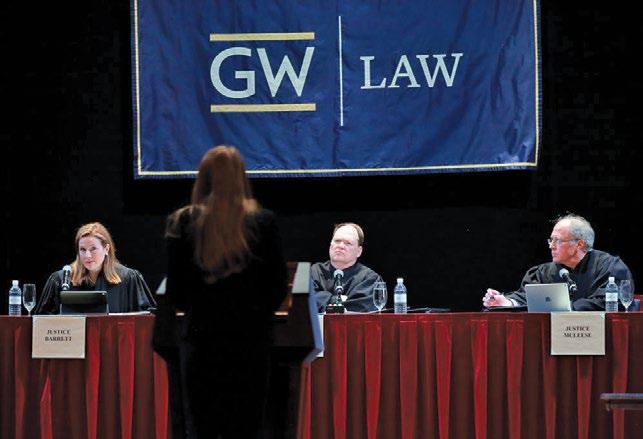

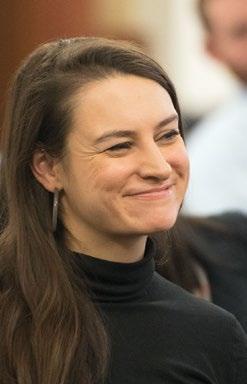
GW Law has an impressive, longstanding record of educating forwardthinking leaders. By 1895, our graduates had already written the patents for Bell’s telephone, Mergenthaler’s linotype machine, and Eastman’s roll film camera.
Today, our LLM and graduate law alumni serve in visible, prestigious roles around the world. Here’s a sample of our graduates’ past and present accomplishments:
• Attorney General of Pakistan
• Chief Justice, Bhutan
• Prime Minister, Mongolia
• Minister of Economic Affairs, Republic of China
• Attorney General of Bhutan
• Second Director General, World Intellectual Property Organization
• Deputy Permanent Representative of Mexico to UNESCO
• Minister of Defense, Romania
• Senator and Minister of State, Ministry of Security, Jamaica
• Member of Parliament, Georgia
• Ambassador of Romania to the United States
• Ambassador of Tanzania to the United States
• Member of the Parliament, Republic of Ghana
• Director, Program on Law and Innovation and Professor of Law, Vanderbilt University Law School
• First female Judge Advocate General, U.S. Navy
• Partners at prestigious law firms such as Sidley Austin and Pillsbury Winthrop
GW Law offers students the tools to launch or advance their legal careers through our extensive curriculum, faculty of well-respected scholars and practitioners, high-quality externship opportunities in the nation’s capital, and emphasis on professionalism and career development.
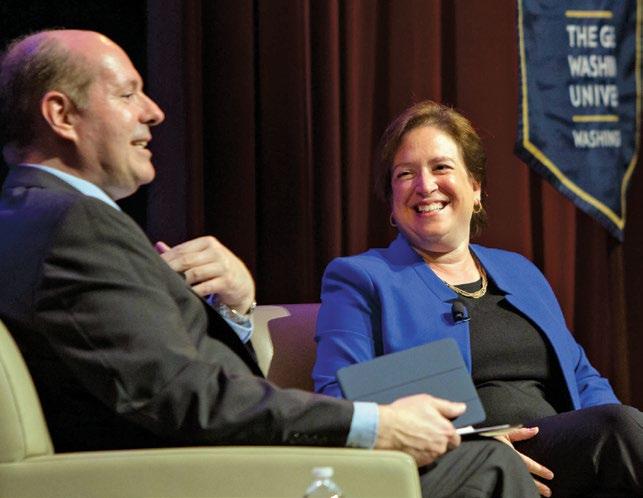
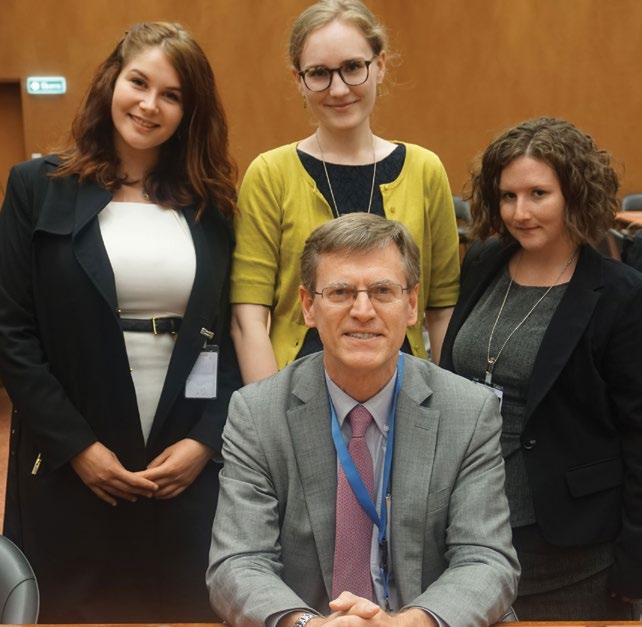
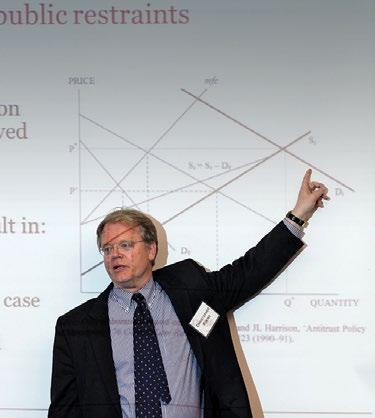
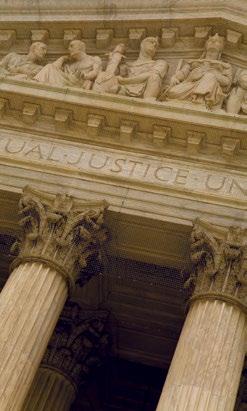
GW offers great opportunities to both study and hold externships nearby. For instance, I found my International Investment and Arbitration class so useful when I interned at the World Bank. It was like seeing my textbook in practice.
NAYOMI GOONESEKERE, LLM ‘19 International and Comparative Law Home Country: Sri Lanka
Our professors bring the legal world into the classroom. For instance, Professor Bradley Clark led a recent conversation with his friend Justice Elena Kagan (pictured left) before a room full of our students. Our professors argue before the Supreme Court, testify on Capitol Hill, and teach at GW Law. That’s what we call “Law in Action.” It means our professors are not only scholars, but that they engage in shaping the practice and evolution of the law. That experience and access benefits our students.
In addition, our D.C. location allows us to draw from the movers and shakers among legal practitioners to round out our adjunct faculty. Leading practitioners from the World Bank, the U.S. Department of Justice, and the Environmental Protection Agency; top think tanks; local and federal courts; and even the Supreme Court bring real-world experience to our classrooms.

It’s all about who we know.
GW Law features a robust selection of 11 specialized LLM degree programs, along with a general LLM for students who may wish to concentrate on one or more areas, such as constitutional law, criminal law, labor law, corporate law, or health care law. In addition, we offer an SJD program for advanced research, as well as a Master of Studies in Law degree in various concentrations for non-lawyers.
Our classes are open to both JD and LLM students, allowing a range of experience, perspective, and outlook that enriches the classroom experience for all. The core courses for each program are listed below. In addition, you can select related courses from among our 275 elective course offerings.
Choose from our extensive catalog of courses to tailor an LLM that focuses on areas such as: Antitrust Law Criminal Law Cybersecurity Law Healthcare Law Labor and Employment Law
Admiralty Advanced Antitrust Law Seminar Advanced International Trade Law Anti-Corruption and Compliance Antitrust Law Banking Law Business Bankruptcy and Reorganization Business Planning Chinese Business Law Commercial Paper—Payment Systems
Consumer Protection Law Corporate Finance Corporate Taxation Corporation Law Seminar Corporations
Creditors’ Rights and Debtors’ Protection Employee Benefit Plans
Energy Law Seminar
Environmental Issues in Business Transactions
Entertainment Law
Federal Income Taxation Graduate Clinical Studies Graduate Independent Legal Writing Insurance International Arbitration
International Banking and Investment Law International Business Transactions International Business Transactions Seminar International Commercial Law International Finance International Investment Law and Arbitration
International Money Laundering, Corruption, and Terrorism International Negotiations International Project Finance International Taxation
International Trade Law
Introduction to Transactional Islamic Law Land Use Law Law and Accounting Law and Economics Law of Real Estate Financing Law of the European Union Legal Drafting (Mergers and Acquisitions) Legal Drafting (Transactional)
Mergers and Acquisitions
Modern Real Estate Transactions Negotiations
Nonprofit Organizations: Law and Taxation Partnership and LLC Taxation
Public Law Seminar Regulated Industries Regulation of Derivatives Regulation of Mutual Funds and Investment Advisers
Secured Transactions
Securities Law Seminar Securities Regulation Selected Topics in Advanced Antitrust Law Selected Topics in Banking Law
Selected Topics in Corporate Law
Selected Topics in Public Law
Selected Topics in Securities Law
Selected Topics in Tax Policy Law
Small Business and Community Economic Development Clinic Sports and the Law State and Local Taxation Tax Policy Seminar
Thesis
Trade and Sustainable Development Unincorporated Business Organization and Agency Law
U.S. Export Control Law and Regulation
White Collar Crime Courses Related to Business and Finance Law: Administrative Law Copyright Law Environmental Law Formation of Government Contracts International Dispute Resolution International Organizations Law of the Sea Legislation
Legislative Analysis and Drafting Local Government Law Patent Law Performance of Government Contracts Space Law
Air Pollution Control
Atomic Energy Law Coastal, Navigation, and Wetlands Resource Law Control of Solid and Hazardous Wastes (RCRA & CERCLA)
Energy Law and Regulation Energy Law Seminar Environmental Law Environmental Negotiations Federal Facilities Graduate Independent Legal Writing International Climate Change Law International Project Finance Natural Resources Law Oil and Gas Law Regulated Industries Selected Topics in Energy Law Selected Topics in Environmental Law Thesis Water Pollution Control Wildlife and Ecosystems Law Courses Related to Energy and Environmental Law: Administrative Law Admiralty Food and Drug Law Formation of Government Contracts Genetics and the Law International Dispute Resolution
Legislative Analysis and Drafting Mediation and Alternative Dispute Resolution Performance of Government Contracts
Advanced International Trade Law Air Pollution Control Animal Law Seminar Atomic Energy Law Coastal, Navigation, and Wetlands Resource Law Control of Solid and Hazardous Wastes (RCRA & CERCLA)
Energy Commodities, Climate Change, and Derivatives
Energy Law and Regulation Energy Law Seminar Environmental and Toxic Torts Environmental Crimes Environmental Issues in Business Transactions Environmental Law Environmental Law Seminar Environmental Lawyering
Environmental Negotiations
Federal Facilities Environmental Law Issues
Graduate Environmental Placement Graduate Independent Legal Writing
International Project Finance Law International Climate Change Law International Environmental Law International Trade Law Land Use Law Natural Resources Law Oil and Gas Law
Regulated Industries Regulation of Toxic Substances Risk Selected Topics in Energy Law Selected Topics in Environmental Law Sustainable Communities Law and Policy Seminar Thesis
Trade and Sustainable Development Water Pollution Control
Wildlife and Ecosystems Law Courses Related to Environmental Law: Administrative Law Admiralty
Food and Drug Law Formation of Government Contracts Genetics and the Law
International Dispute Resolution Legislative Analysis and Drafting Mediation and Alternative Dispute Resolution Performance of Government Contracts
Anti-Corruption and Compliance
Federal Grants Law
Formation of Government Contracts
Government Contracts Advocacy Government Contracts Cost and Pricing
Government Contracts Moot Court Government Contracts Overview Government Contracts Seminar
Government Procurement of Intellectual Property Seminar
Graduate Government Contracts Placement Performance of Government Contracts Procurement in International Development Selected Topics in Government Procurement
Thesis Courses Related to Government Procurement Law: Administrative Law Antitrust Law Business Planning Corporate Taxation Cybersecurity Law and Policy Disaster Law Employment Discrimination Law Environmental Law Federal Courts Government Lawyering Health Law and Policy International Business Transactions International Commercial Law International Money Laundering, Corruption, and Terrorism
Labor Law Law and Accounting
Legislation
Legislative Analysis and Drafting Local Government Law Patent Law Public Law Seminar Mediation and Alternative Dispute Resolution Negotiation and Conflict Management Systems Design
Air Pollution Control
Comparative Public Procurement Control of Solid and Hazardous Wastes (RCRA & CERCLA)
Environmental Impact Statement Environmental and Toxic Torts Formation of Government Contracts Government Contracts Cost and Pricing Government Contracts Overview Graduate Independent Legal Writing Performance of Government Contracts Procurement in International Development Thesis Trade and Sustainable Development Water Pollution Control
For related courses, please see the Law School Bulletin
Advanced Trademark Law Art, Cultural Heritage, and the Law Seminar Chemical and Biotech Patent Law Computer Law Copyright Law Design Law
Enforcement of Intellectual Property Rights in the U.S. International Trade Commission Entertainment Law
The Federal Circuit
Government Procurement of Intellectual Property Seminar Information Privacy Law
Intellectual Property Antitrust Seminar Intellectual Property Law Seminar
Intellectual Property and Technology Law Clinic
International and Comparative Patent Law
International Copyright Law
International Intellectual Property Law Internet Law
Law in Cyberspace Legal Drafting (IP)
Licensing of Intellectual Property Rights
Patent Appellate Practice Patent Enforcement Patent Law
Patent Strategies and Practice Selected Topics in Intellectual Property Law Trade Secrets Law Thesis
Trademark Law and Unfair Competition USPTO Post-Grant Patent Proceedings
Courses Related to Intellectual Property Law: Antitrust Law
Formation of Government Contracts Genetics and the Law Law and Medicine Sports and the Law Telecommunications Law
INTERNATIONAL AND COMPARATIVE LAW (INCLUDES REGULAR AND PRACTICAL TRACKS, PLUS CONCENTRATIONS IN (1) INTERNATIONAL HUMAN RIGHTS AND (2) INTERNATIONAL ARBITRATION, MEDIATION, AND DISPUTE RESOLUTION)
Advanced International Trade Law
Alternative Dispute Resolution Arbitration
Chinese Business Law
Chinese Law and Legal Institutions
Civil and Human Rights Clinic Commercial Arbitration

Comparative Constitutional Law Comparative Law
Comparative Law Seminar
Comparative Public Procurement Conflict of Laws Constitutional Law II Contracts
Enforcement of Intellectual Property Rights in the U.S. International Trade Commission Human Rights and Environmental Protection Human Rights Lawyering Human Trafficking Law Immigration Clinic Immigration Criminal Enforcement Immigration Law I Immigration Law II Individual and Group Rights International and Comparative Patent Law
International Arbitration
International Banking and Investment Law
International Business Transactions International Business Transactions Seminar International Climate Change Law International Commercial Law International Copyright Law International Criminal Law International Dispute Resolution International Environmental Law International Family Law International Finance International Human Rights of Women International Intellectual Property International Investment Law and Arbitration International Law International Law of Human Rights International Litigation International Money Laundering, Corruption, and Terrorism
International Organizations International Project Finance International Taxation International Trade Law Introduction to Transactional Islamic Law Islamic Law Law of the European Union Law of the Sea Law of War Mediation Mediation and Alternative Dispute Resolution Nation Building and the Rule of Law Negotiations Procurement in International Development Public International Law Seminar Refugee and Asylum Law Regional Protection of Human Rights Selected Topics in Public International Law Space Law Thesis
Trade and Sustainable Development U.S. Export Control Law and Regulation U.S. Foreign Relations Law Courses from GW–Oxford Summer Program in International Human Rights Law: Economic, Social, and Cultural Rights—Law and Practice Gender, Sexuality, and International Human Rights Law Human Rights Advocacy and Dissemination Human Rights in a Digital Age Human Rights in the Marketplace Human Rights and Military Responses to Terrorism International Human Rights and Refugee Law
International Law of Human Rights International Rights of Women War, Peace, and Human Rights For related courses, please see the Law School Bulletin
Advanced International Trade Law
Air Pollution Control Control of Solid and Hazardous Wastes (RCRA & CERCLA)
Environmental Law Environmental Law Seminar Graduate Independent Legal Writing International Business Transactions International Climate Change Law International Environmental Law International Law International Organizations International Trade Law Law of the Sea
Selected Topics in Environmental Law Thesis Trade and Sustainable Development Water Pollution Control
For courses related to International Environmental Law, please see the Law School Bulletin
Advanced Evidence Advanced Evidence Seminar
Advanced Trial Advocacy Alternative Dispute Resolution
The American Jury Arbitration
The College of Trial Advocacy Criminal Tax Litigation Domestic Terrorism Drugs and the Law Ethics in Adjudication and Settlement Graduate Clinical Studies
International Dispute Resolution Mediation and Alternative Dispute Resolution Negotiation and Conflict Management Systems Design
Pre-Trial Practice in Civil Cases
Pre-Trial Practice in Criminal Cases
Problems Trying Terrorists
Transnational Security Courses Related to Litigation and Dispute Resolution (partial list):
Adjudicatory Criminal Procedure
Advanced Appellate Advocacy
Appellate Practice
Civil Procedure Seminar Complex Litigation
Congressional Investigations Seminar Criminal Law and Procedure Seminar
Criminal Tax Litigation Evidence
The Federal Circuit Forensic Science Law and Rhetoric Litigation with the Federal Government
Pre-Trial Advocacy Remedies
White Collar Crime
Artificial Intelligence Law and Policy Aviation Law and National Security Comparative Military Justice Computer Crime Computer Law
Congressional Investigations Seminar
Constitutional Law Seminar: Cyber, Privacy, and Speech Counterintelligence Law and Policy Counterterrorism Law
Crisis and Legal Controversy in the CIA Cybersecurity Law and Policy Cybersecurity Law and Technology Disaster Law Domestic Terrorism
Foreign Access to U.S. Technology Foreign Intelligence Surveillance Act Homeland Security Law and Policy Human Trafficking Law Immigration Criminal Enforcement Immigration Law I Information Privacy Law Intelligence Law International Criminal Law International Law
International Law of Human Rights International Money Laundering, Corruption, and Terrorism Internet Law
Law in Cyberspace Law of Separation of Powers Law of the Sea Law of War Legislation
Military Justice Nation Building and the Rule of Law
National Security Law
Nuclear Nonproliferation Law and Policy Problems Trying Terrorists in Article III Courts
Public International Law Seminar
Public Law Seminar (Telecommunication and Technology)
Reading Group (Blockchain Law and Policy)
Reading Group (Disinformation and National Security)
Refugee and Asylum Law
Selected Topics in Cybersecurity Law
Selected Topics in National Security Law Space Law
Technology Foundations for Cybersecurity Telecommunications Law
Thesis
Transnational Security
U.S. Export Control Law and Regulation
U.S. Foreign Relations Law
Admiralty
Artificial Intelligence Law and Policy Aviation Law and National Security Comparative Military Law Computer Crime Congressional Investigations Seminar Counterintelligence Law and Policy Counterterrorism Law Crisis and Legal Controversy in the CIA Cybersecurity Law and Policy Cybersecurity Law and Technology Disaster Law Domestic Terrorism Foreign Access to U.S. Technology Foreign Intelligence Surveillance Act Homeland Security Law and Policy Human Trafficking Law Immigration Criminal Enforcement Immigration Law Information Privacy Law Intelligence Law International Criminal Law International Law International Law of Human Rights International Money Laundering, Corruption, and Terrorism Law of Separation of Powers Law of the Sea
Law of War Legislation Litigation with the Federal Government Military Justice Nation Building and the Rule of Law National Security Law National Security Law Seminar Nuclear Nonproliferation Law and Policy
Problems Trying Terrorists in Article III Courts Public International Law Seminar Reading Group (Disinformation and National Security)
Refugee and Asylum Law Selected Topics in Cybersecurity Law Selected Topics in National Security Law Selected Topics in Public International Law Space Law Technology Foundations for Cybersecurity Thesis
Transnational Security U.S. Export Control Law and Regulation U.S. Foreign Relations Law Veterans Advocacy Veterans Law For related courses, please see the Law School Bulletin.
GW–Oxford Summer Program in International Human Rights Law (see course listings under International and Comparative Law above)
Munich Intellectual Property Summer Program
Doctor of Juridical Science (SJD)
* Courses are typically offered at least once per year. Some courses are offered in multiple program areas and therefore may appear more than once in the lists above. Course listing based on 2022-23 Law School Bulletin.
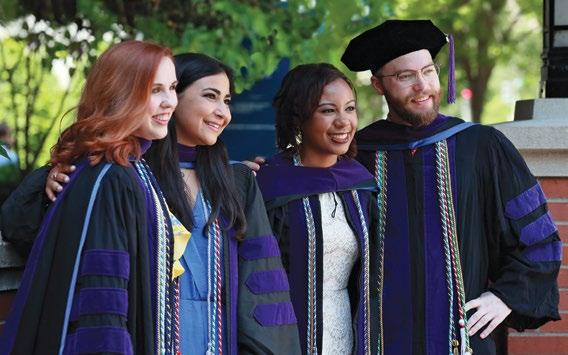
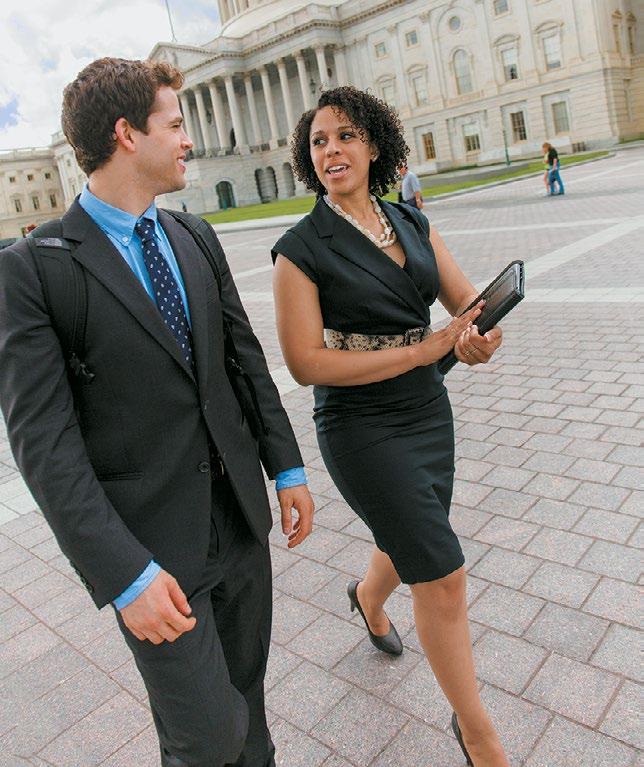
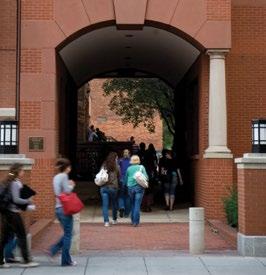
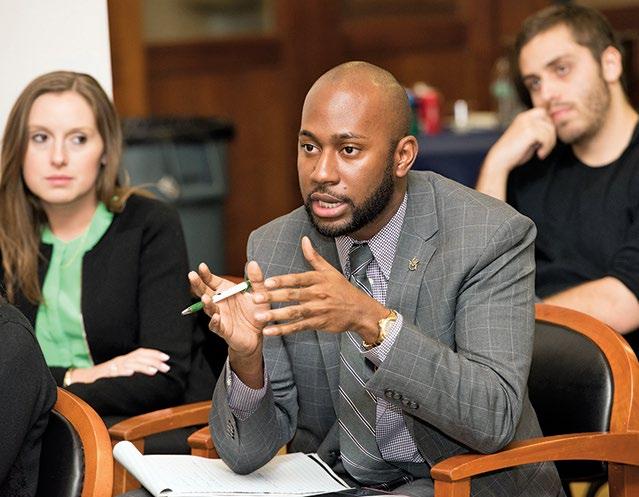
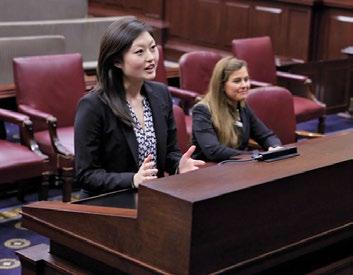
Influential people aren’t just near here, those people come here. During my first few days at GW, I met U.S. Supreme Court Justice Ruth Bader Ginsburg at an on-campus event. It makes learning here feel different.
PARHAM ZAHEDI, LLM ‘19 National Security and U.S. Foreign Relations Law Home country: Iran
GW Law is more than a law school, it is truly a community of legal professionals striving for excellence in a collegial environment. Our student body is diverse. Among graduate law applicants for the fall 2022 entering class, for instance, 86 countries were represented among applicants. The class includes recent law school graduates, military judge advocates, solo practitioners, law clerks, human rights activists, prosecutors, corporate counsel, judges, and government officials, as well as Fulbright scholars.
Our U.S. and international LLM students take their courses together, as well as with JD students. In our classrooms, therefore, students find fertile ground for discussions that incorporate global perspectives and insights from both experienced and burgeoning legal minds.






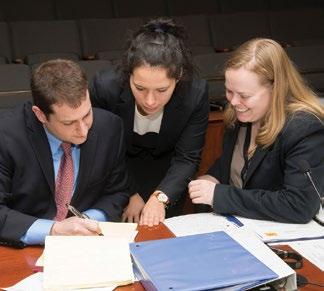




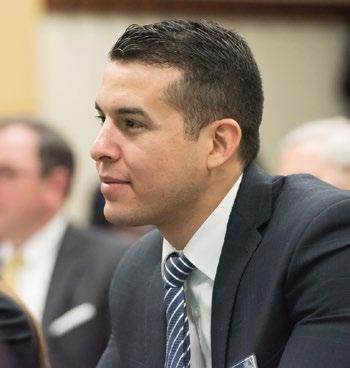
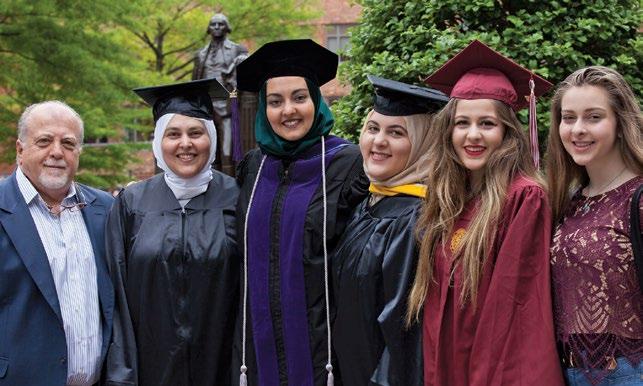
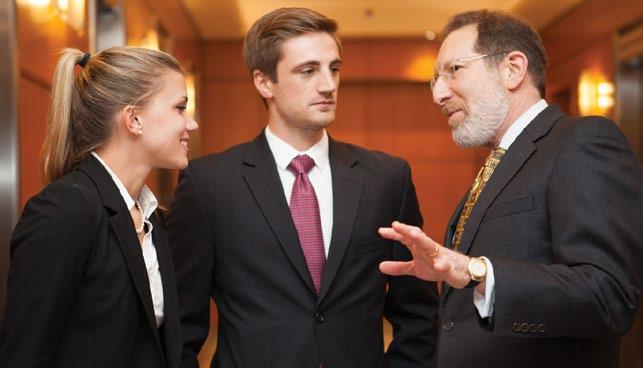
Each year, talented students who received their legal training at law schools outside the United States enroll at GW Law. The fall 2022 graduate law entering class included students from 47 countries. The top countries represented were United States, India, Brazil, China, South Korea, Egypt, Ethiopia, France, Germany, Nigeria, Colombia, and Georgia.
International students take courses with U.S. students, working side-byside with both LLM and JD students. This proximity allows students to exchange ideas and insights and form strong, lasting bonds. In addition, courses available in our degree programs satisfy the New York Bar requirements for foreign-trained attorneys who plan to sit for a U.S. bar exam.
GW Law’s Graduate and International Programs office provides a range of assistance to international students to ensure a smooth transition to the United States and to the GW campus. Services include academic advising and course selection guidance, and assistance with issues including housing, campus resources, and life in Washington, D.C. We also assist students in developing an individual plan for their next steps after degree completion, whether the student plans to remain in the United States to gain practical training before returning to their home country or plans to sit for a U.S. bar exam.


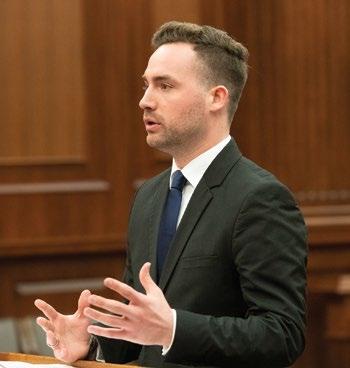
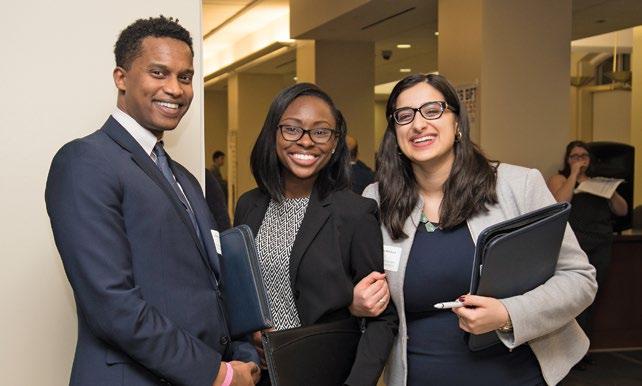
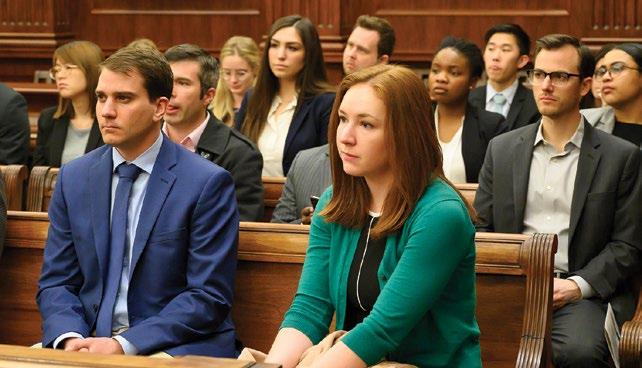
Our students benefit from GW Law’s proximity to the variety of institutions that surround our campus. GW is located in the heart of D.C., across the street from the World Bank and International Monetary Fund, two blocks from Big Law on K Street, and three blocks from the State Department. We are a short Metro ride away from the Supreme Court, the U.S. Patent and Trademark Office, the Environmental Protection Agency, and a host of nongovernmental and policy agencies.
That proximity, along with the established networks of our faculty, staff, and alumni, offers students unparalleled, yearlong access to internship opportunities. In addition, students in the LLM Programs in Business and Finance Law, Intellectual Property Law, Government Procurement Law, National Security and U.S. Foreign Relations Law, and International and Comparative Law, as well as the general LLM program, may be able to earn credit for qualifying internships through GW Law’s Field Placement Program.
Our LLM students have held internships at the American Bar Association Rule of Law Initiative, World Bank Global Forum on Law Justice and Development, Law Library of Congress, World Bank Multilateral Investment Guarantee Agency, and other international organizations in the area, to name a few.
All of our programs satisfy the requirements of the New York State Bar Association.




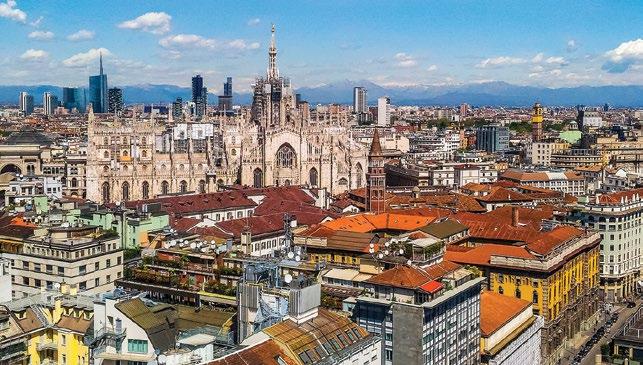

Law students, practicing lawyers and judges, members of the armed forces, government officials, and persons working for nongovernmental and intergovernmental organizations in the field of international human rights come together to study international human rights through GW’s program each summer. Classes are held and accommodations provided at New College, Oxford. Approximately 65 students representing more than a dozen countries participate each year.
GW Law offers a two-week intellectual property law program each summer in Munich, Germany, a city known as Europe’s “Intellectual Property Capital.” The program offers courses, special lectures, and site visits to local IP institutions such as the European Patent Office.
Typically, 25 students from GW Law, other American ABA-approved law schools, and foreign law schools participate each summer.
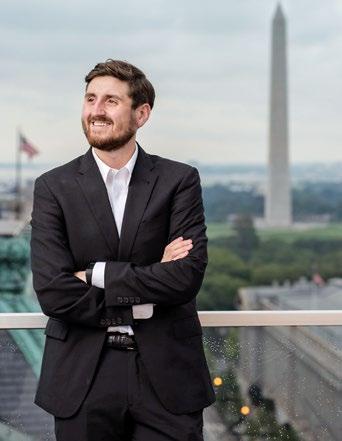
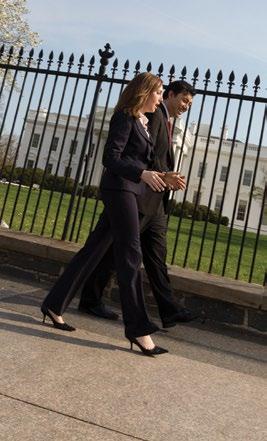
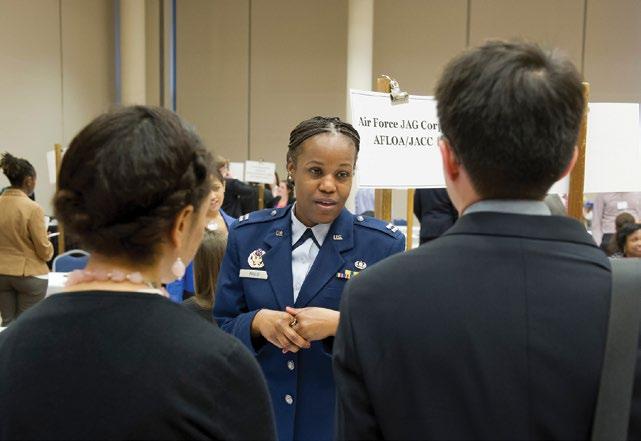
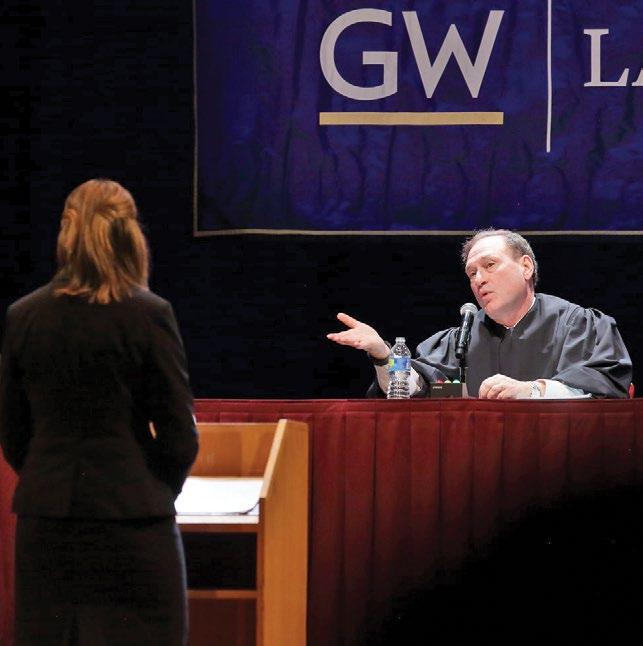
What I’m learning in my LLM classes is specifically applicable to what I’m doing at work. It would take about 10 years to amass the knowledge I’m learning now in one year.
CRAIG BARRETT, LLM ‘19 Government Contracts
JD: University of Pennsylvania Law School

With one of the largest legal career counseling teams in the country, GW Law is dedicated to helping LLM students develop a personalized career path in today’s competitive job market, whether it be for an internship during the academic year or for full-time employment upon completion of their LLM.
A dedicated LLM Career Counselor works closely with the Graduate and International Programs Office to host professional development events for LLM students, including networking receptions with practitioners and alumni, career counseling, mock interviews, and resume workshops.
In addition, GW Law participates in the International Student Interview Program held in New York each year.
Our alumni practice law throughout the United States and in more than 40 countries around the world.
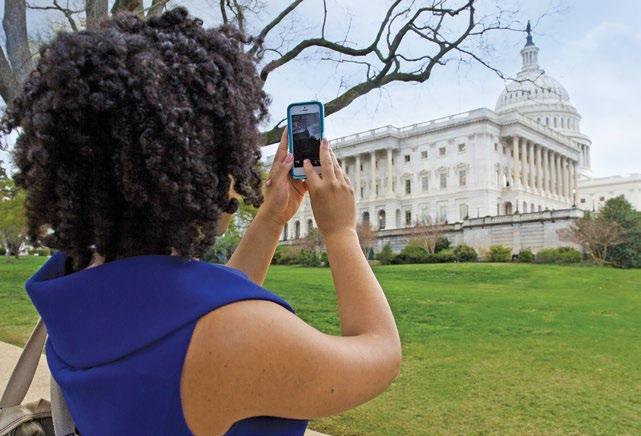

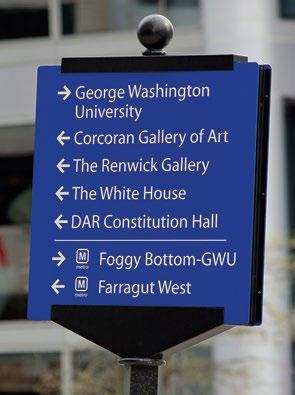

I was amazed by the number of international students and the wide diversity of nationalities represented. It allows for a greater exchange of information and expands your knowledge of other countries, especially as it relates to the law.
KENZA HAMACHE, LLM ‘19 Business and Finance Law Hometown: Paris, France
The movers and shakers in the world of law and policy all have ties to D.C. Many of them teach at GW Law; others come to visit. Each year, our students are enriched by networking opportunities provided by more than 400 on-campus events featuring high-level officials and practitioners.
In addition, GW Law hosts major conferences and symposia throughout the year. For example, the law school hosts the State Department’s Public International Advisory Committee meetings, which are open to the public. In addition, we host conferences on international arbitration and on anti-corruption and anti-terrorism, along with annual events such as the Shapiro Conference on environmental law, the Manuel F. Cohen Lecture given by notable figures in business and finance law, the annual intellectual property symposium, and the Global Internet Freedom Project featuring speakers on the intersection of internet freedom and human rights.

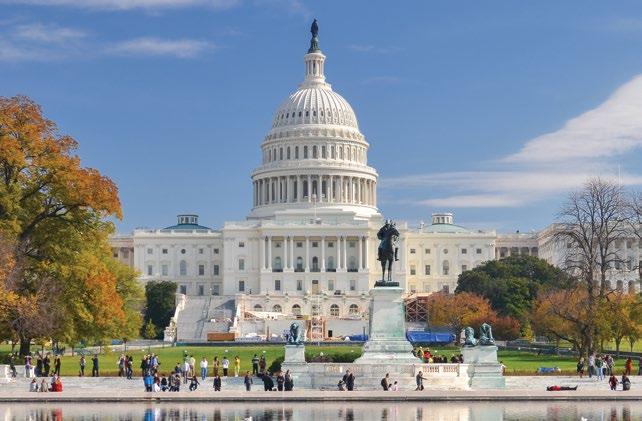
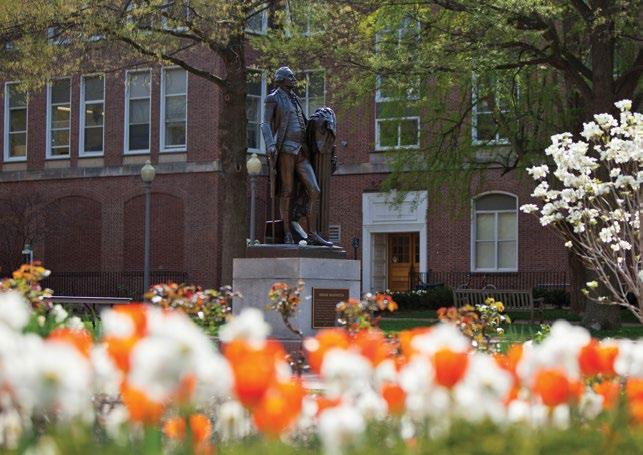
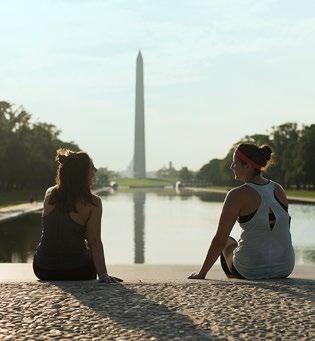


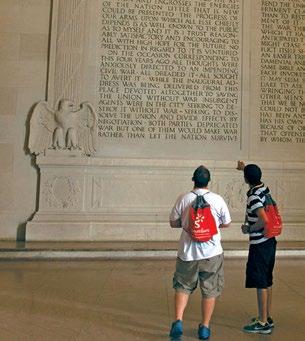
Another advantage of attending GW Law is participating in the life of the city. D.C. is a vibrant, multinational city of diverse treasures. The resonance of its history is everywhere. Our students frequently tell stories of walking near campus and doing a double-take as they spot the edge of the Lincoln Memorial or the top of the Washington Monument. Such extraordinary, everyday moments. D.C. is full of those moments. It offers a blend of American history, international flavor, and cultural activity that few cities can match, and it has been called the most livable city on the East Coast. Each neighborhood has a unique character, and few cities can match D.C.’s urban energy or its highly educated and multinational population.
As with any great international city, D.C. is home to world-class museums, as well as bookstores, theaters and concert halls, seasonal festivals, professional sports teams, coffee bars, and an eclectic mix of restaurants. GW Law students can easily access almost any part of the D.C. metro area using Metrorail and Metrobus. From the Foggy Bottom-GWU stop, located right on campus, students can arrive within minutes at internships on Capitol Hill, a baseball game at Nationals Park, or an exhibit at the National Gallery.
The D.C. metropolitan area can be a great place for raising a family as well. In addition to numerous strong public school systems, there is a wide variety of kid-friendly activities (many of them free).
For priority consideration: March 15
For space-available consideration: until June 1
For spring entry: November 1
COSTS AND FINANCIAL AID (2022-23)
LLM full-time tuition: $56,880*
LLM part-time tuition: $2,370* per credit hour
Estimated living expenses (for 9-month academic year): $29,600
*For planning purposes, LLM students should expect an annual increase in tuition of five to seven percent.
All applicants will be automatically considered for merit and other scholarships, as appropriate, at the time of application. There is no separate scholarship application.
GW Law Merit Scholarship covers full or partial tuition for U.S. and non-U.S. law school graduates and is awarded on the basis of academic merit and financial need.
Thomas Buergenthal Scholarship covers full or partial tuition for nonU.S. law school graduates and is awarded on the basis of academic merit and financial need.
Ben Gupta Endowed Fund for International Legal Education provides need-based scholarships to non-U.S. law school graduates from the developing world.
The Licks Attorneys LLM Scholarship provides tuition assistance to Brazilian law school graduates.
Arochi Lindner LLM Scholarship provides assistance to Mexican law school graduates.
Richard P. Momsen Fund for Brazilian Law Graduates provides tuition assistance to Brazilian law school graduates with a special interest in U.S. constitutional law or intellectual property law.
The Honorable Gerald J. Mossinghoff Fellowship for Graduate Research in Intellectual Property Law is awarded annually to an LLM candidate who is a U.S. law school graduate. Preference will be given to a candidate specializing in the pharmaceutical field.
Randolph C. Shaw Graduate Fellowship is awarded to a U.S. law school graduate who is an LLM candidate in the Environmental Law program. The recipient will assist the program’s director on a parttime basis.
GW Law welcomes veterans and participates in the Veterans Administration’s Yellow Ribbon Program.
All LLM applicants must hold a JD or equivalent law degree earned with high rank from a law school that is a member of the Association of American Law Schools (AALS), or is accredited by the American Bar Association (ABA), or is a recognized non-U.S. institution. Non-U.S. law school graduates also may need to meet the minimum language test requirement. All SJD applicants also must hold an LLM degree with high rank from an AALS- or ABA-approved law school.
Students whose initial law degree was earned from a non-U.S. law school where English is not the language of instruction are required to take the Test of English as a Foreign Language (TOEFL) and submit an official score report. Minimum required score is 100 IBT or 600-point range on the paper-based test. IELTS scores of 7.0 or higher are accepted in lieu of the TOEFL.
Applications can be submitted electronically through the Law School Admission Council at www.lsac.org. Prospective students also may print application forms and/or request that printed application materials be mailed to them from our website at www.law.gwu.edu. More detailed information on GW Law’s academic programs, as well as entrance and degree requirements for LLM and SJD programs, is available at www.law.gwu.edu/llm-admissions.
CONTACT US
Graduate and International Programs
The George Washington University Law School 2000 H Street, NW Washington, D.C. 20052 202.994.7242 Fax: 202.994.2831 llmadmissions@law.gwu.edu
The George Washington University does not unlawfully discriminate against any person on any basis prohibited by federal law, the District of Columbia Human Rights Act, or other applicable law, including without limitation, race, color, religion, sex, national origin, age, disability, veteran status, sexual orientation, or gender identity or expression. This policy covers all programs, services, policies, and procedures of the university, including admission to education programs and employment.
The law school is housed in a nine-building complex on GW’s Foggy Bottom Campus. The complex features modern classrooms, three fully equipped moot court rooms, multiple student lounges and conference rooms, and WiFi access throughout.
Four blocks from GW Law, the White House—seat of the nation’s executive branch—and nearby Executive Office Building provide several field placement opportunities in fields such as constitu tional law and administrative law.
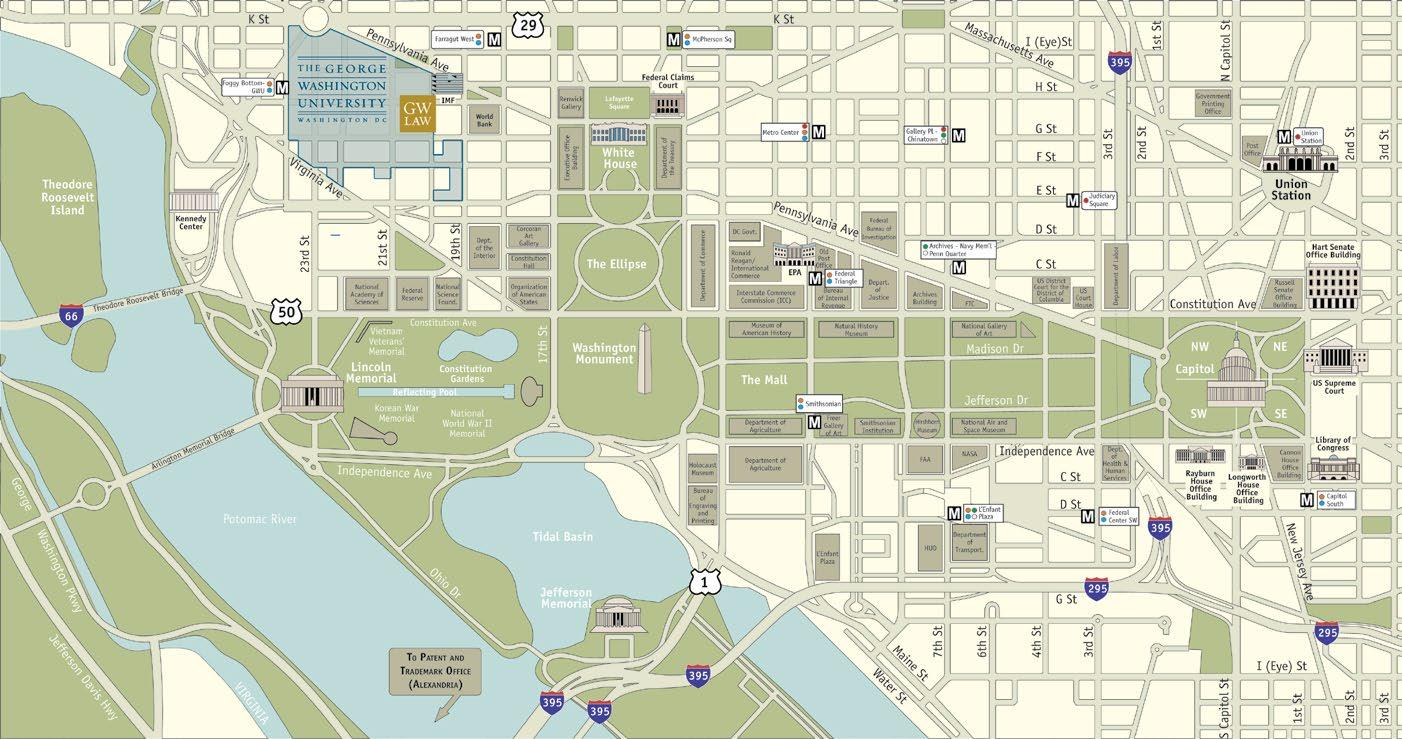
Through its work helping fund improve ments in developing countries, the World Bank—only a block from GW Law—is a valu able resource for students interested in international law and finance law.
Located right across the street from the law school, the IMF oversees the global financial system and gives students the chance to observe inter national law and finance law in action.
The executive branch’s agency of foreign affairs, the State Department is a Foggy Bottom landmark three blocks from GW Law. It provides students with a firsthand look at international law at the highest level.
Five blocks from the law school, the U.S. Court of Federal Claims hears claims made against the U.S. government. At the same location, the U.S. Court of Appeals for the Federal Circuit has nation wide jurisdiction in a number of subject areas. GW Law students can find clerkships with judges in both courts.
Made up of 35 nations in North and South America, the OAS works to preserve peace and further development on both continents. GW Law students can find placements in fields as varied as trade law and drug law.
As the nation’s official center for performing arts, the Kennedy Center hosts a variety of cultural events and is home to the National Symphony Orchestra, the Washington Ballet, and the Washington National Opera.
These three monuments to American presi dents are some of the most recognizable landmarks in D.C. All are within walking distance of the law school.
The famed Smithsonian “Castle” is the headquarters of the institution, which over sees 17 Washington museums, including the National Air and Space Museum and the National Portrait Gallery.
Students interested in environmental law can find field placements at this federal agency charged with protecting human health and the environment. The EPA’s headquarters are a short Metro ride from GW Law.
Recent field placements on Capitol Hill have included the Senate Health, Education, and Pensions Committee; the Senate Judiciary Committee; and the House Republican Judiciary Committee. The Hill is easily accessible from GW Law by Metro.

With the world’s largest collection of legal materials, the Library of Congress is an excellent research resource for law students in all areas of specialization.
The highest court in the land is an ideal venue for students to observe high-profile legal proceedings, as well as pursue clerk ships and field placements. During the past decade, seven GW Law grads have gone on to clerk for Supreme Court justices. The court is accessible by Metro.
GW Law students frequently find field placements at the government’s legal headquarters, working in fields ranging from counterterrorism to intellec tual property litigation. The Justice Department is a short Metro ride from the law school.
The federal trials court for Washington, D.C., offers clerkship opportunities in the chambers of its judges. The district court is Metro-accessible from GW Law.
This Alexandria, Virginia, office is a center of the intellectual property law community. Recent GW Law students have been placed in the Office of the Commissioner. The Patent and Trademark Office is easily reached by Metro and is a 20-minute drive from the law school.
WASHINGTON UNIVERSITY LAW SCHOOL
